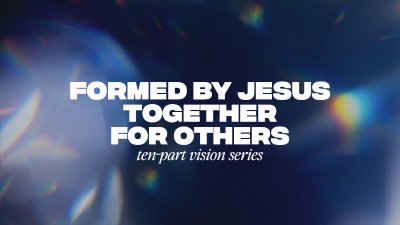


Formed by Jesus, Together, For Others
Vision Series
For Others Around the World - Vision Series E10
October 2, 2022 • Trey Van Camp • Genesis 12:1–3, Revelation 7:9
Throughout the storyline of the Bible, we see that God’s desire is to bless all of humanity. It starts with Adam and Eve, but rather than spread God’s blessing and goodness to the world, they spread sin and death. But God doesn’t leave humanity hopeless and helpless. Instead, he chooses the people group of Israel to provide blessing and healing to the rest of the world. As a nation of people set apart by God, Israel was given the unique opportunity of allowing God to bless the whole world through them. Today, we have the same opportunity. But rather than waiting for the nations to come to us, Jesus’ last command while on earth was to go to the nations ourselves. As we allow ourselves to be formed by Jesus, we must remember that we do this for the sake of others and not just for our own self-improvement. We also must remember that God’s intention is to restore all of humanity from all nations. By intentionally praying for the nations, giving sacrificially, and by actually going to the nations, we can continue God’s work of providing blessing and salvation to the rest of the world.
For Others at the Workplace - Vision Series E9
September 25, 2022 • Trey Van Camp • Genesis 12:1–3, Revelation 7:9
Our workplace is one of the most strategic places where we can effectively share the gospel. We spend roughly 1/3rd of our life there, we regularly interact with the same people there, and we contribute to the well-being of society by what we do there. However, most of us also have negative feelings and experiences associated with work. We wake up, toil, grind, and come home exhausted only to do it again the next day. Or we work tirelessly to get more power, approval, security, and comfort. At its best, work is a necessary evil. At its worst, work is a false god that never gives us what it promises. But the way of Jesus provides us an alternative: to see our work as the means by which God uses us to restore beauty, goodness, and well-being to the world around us. By seeing our work through this lens of restoration, we can start detaching ourselves from these lies about work and begin utilizing our workplaces to invite other into the way of Jesus. Rather than living to work and working to live, followers of Jesus can love to work and work to love.
For Others in the Neighborhood - Vision Series E8
September 18, 2022 • Trey Van Camp • Mark 2:13–17
It is becoming increasingly difficult to share the way of Jesus with our lost neighbors. Political tribalism, spiritual suspicion, and the recent phenomenon of religious deconstruction all form a perfect storm of hostility towards Christians who try to invite others to follow Jesus. In Jesus’ day, the world was much the same. But rather than combat or retreat from the world, Jesus confronts the world’s hostility with hospitality. The meals that Jesus shared with others were invitations to relationship, opportunities for reconciliation, and a demonstration of the love that God has for all people. Today our mission and outreach must come from our discipleship to Jesus, and not the other way around. This means that we must learn the practice of hospitality as a way to invite others to witness the love of God. When we share a meal with others, we remind ourselves that God chose to seat us at his table in the Kingdom despite our sin. We also demonstrate to our neighbors that the love of God is on offer to everyone who wants to accept it.
Together as Family - Vision Series E7
September 11, 2022 • Trey Van Camp • Titus 2:1–8
In our day and age, healthy relationships built on mutual love and service between generations are rare. We easily find ourselves frustrated with the problems left behind by those older than us, or frustrated by the ambition and naiveite of those younger than us. But these frustrations only keep us stuck in our own struggles and fears. Those in their first half of life find themselves ambitious, but lonely. Those in their second half of life find themselves faithful, but angry. In Titus 2, Paul gives practical instruction on how we can overcome these frustrations by mending our relationships. When we commit to listening to and learning from others in different life stages, we complete the family of Christ and act as an alternative community who prizes each other’s gifts and stages.
Together in Groups - Vision Series E6
September 4, 2022 • Trey Van Camp • Matthew 4:18–22
Honest relationships, genuine connections, and healthy friendships are all hard to come by in our modern age. While we might experience increased connectedness through the internet and social media, most of us lack real friendships with other people. As a result, we default into radical individualism or rugged tribalism, both of which feed our experienced loneliness and isolation. But the way of Jesus offers us a remedy to our loneliness by way of community. When Jesus lived on earth, he entered a world of broken people and invited them to live life with him. And the community that he formed with these people wasn’t jeopardized by their drastic differences. Instead, their relationships with each other were strengthened by their commitment to their rabbi. Today, we can experience the same type of life-giving relationships by adopting Jesus’ 4 components of community: Proximity, Vulnerability, Practice, and Mission.
Together on Sundays - Vision Series E5
August 28, 2022 • Trey Van Camp • 1 Peter 4:7–11
Until recently, disciples of Christ Jesus always valued and treasured the weekly gathering of the saints. It was a consistent place and time to habituate our minds, hearts, and bodies toward a community of love, joy, and peace through the acts of worship, service, and communion. But with the advent of the internet, do we really need to be together in person to accomplish these functions of the church? Looking to the wisdom of 1 Peter 4:7-11, we learn the grace of God is poured out on the saints when they gather together to stay alert, love each other deeply, and open up their hearts without grumbling. By humbly using our gifts to serve one another in the church, we reject the lies from the world that community must be entertaining, idealistic, virtual, and tribal.
Formed by the Leadership of Jesus - Vision Series E4
August 21, 2022 • Trey Van Camp • John 8:30–41
Life is more demanding and complex than we all imagined it would be. To take the edge off, we look to stories to help us make sense of life. In the modern age, the default narrative we believe is the myth of self-actualization and self-expression. But have we ever stopped to question how helpful this story has been for our souls and our society? Following the leadership of Jesus, we learn to resist the lies of the Enemy by adopting His teachings of reality. We experience this freedom by (1) identifying an anxious thought or feeling, (2) detecting the lie beneath the sensation, and (3) declaring the truth of God’s word to our weary and wounded souls.
Formed by the Life of Jesus - Vision Series E3
August 14, 2022 • Trey Van Camp • Galatians 5:16–26, Galatians 6:7–9
The end goal of the Christian life is to commune with God so that we become people of love, joy, and peace for the sake of our neighbors (Ga 5:13; 16-26). The problem many of us face is that we simply don’t know how to get there. Without a roadmap, we naturally give all our attention and time to self-gratification, pleasure, and selfish ambition. Instead, Jesus offers us a better way to live. By learning to walk in the Spirit rather than in our flesh, we slowly begin to kill the desires of our flesh. We do this by training ourselves with the practices of Jesus rather than trying to better ourselves through our own willpower.
Formed by the Love of Jesus - Vision Series E2
August 7, 2022 • Trey Van Camp • 1 John 2:15–17, 1 John 4:7–16
The Modern Age believes change exclusively comes from more knowledge. As a result, civilization is convinced it will progress into a utopia as our access to information increases exponentially. But how do we explain the evil and brokenness we still see in the educated regions of the world? How can we explain the gap between what we know is right and our perpetual failure to do what is right? Knowing the anatomy of the soul, Jesus, our Rabbi, doesn’t just inform our intellect but shapes our desires. By default, our desires are shaped by the world in 3 ways: (1) the lust of the flesh (2) the lust of the eyes, and (3) pride in one’s possessions [1 Jn. 2:15-17]. But by design, we can begin to redirect our desires by anchoring our identity in the love Jesus has for us through the consistent practice of abiding [1 Jn. 4:7-16].
How People Change - Vision Series (E1)
July 31, 2022 • Trey Van Camp • Matthew 11:25–30
In week one of our vision series, we learned about what it means to be formed by Jesus. Rather than allowing ourselves to be formed by the world, the flesh, and the devil, Jesus offers us a better way to live. When we allow ourselves to be formed by Jesus, we slowly become steadfast people who are able to love others the way that God loves us. In order to do this, we must position ourselves to be formed by Jesus’ love, life, and leadership. Leaving out any one or two of these elements makes us stuck, stubborn, or stingy.


